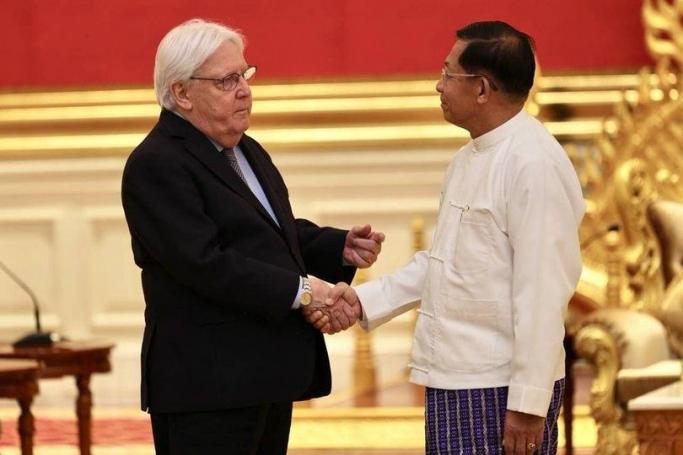Mizzima Editorial
There are limits to what diplomacy can achieve. As the United Nations marks World Humanitarian Day on 19 August, questions still hang over whether UN entreaties to the Myanmar military junta post-Cyclone Mocha will eventually result in the “green light” for allowing in UN humanitarian aid.
World Humanitarian Day is a campaign by the United Nations Office for the Coordination of Humanitarian Affairs (OCHA).
Questions are in the air after Martin Griffiths, UN head of Humanitarian Aid, met Myanmar junta leader Min Aung Hlaing on 15 August in Naypyidaw, yet one more UN representative to rock up to meet the generals, a full three months after Cyclone Mocha wreaked havoc across a swathe of the country.
According to the junta’s foreign ministry, during the meeting they discussed the ways to enhance coordination with the United Nations in post-Mocha rehabilitation work.
This included the practicalities of renewing the UN’s permits to operate in Myanmar and a call by Mr Griffiths to international donors around the world for funding to those affected by the Myanmar crisis.
Let’s be clear. UN representatives have carried out humanitarian aid programmes around the world for decades to help those in need – estimating that today one in 22 people around the world are currently in need. And there have been many times when such outreach has been dangerous. On 19 August 2003, a bomb attack on the Canal Hotel in Baghdad, Iraq, killed 22 humanitarian aid workers, including the UN Special Representative of the Secretary-General for Iraq, Sergio Vieira de Mello. Five years later, the UN General Assembly adopted a resolution designating 19 August as World Humanitarian Day.
As the UN points out, their humanitarian efforts around the world have grown, and so too have the challenges they face. From rising geopolitical tensions and the blatant disregard of international humanitarian law, to deliberate attacks and disinformation campaigns, their work is more difficult and dangerous than ever.
But as the world marks World Humanitarian Day, Myanmar junta intransigence shows how the best will in the world cannot always break through the roadblocks, dangers and red tape inherent in dealing with troublesome gatekeepers.
The Myanmar junta is one such gatekeeper.
Several UN delegations have reached out and met with the Myanmar junta in attempts to gain permission from Naypyidaw to deliver humanitarian aid to those badly affected by Cyclone Mocha that struck Rakhine State and other states and regions in May. Some international and local aid has been getting through, notably food and medicine parcels from the World Food Programme. Some aid has come in from China and India, arriving in Yangon to then reportedly be transported to Rakhine State.
But, by and large, cyclone victims continue to cry out for help, calling just for the basics of food, medicine and shelter to no avail. Many have received nothing – just an empty promise from the Myanmar junta that they will help, a promised made in June.
The UN does humanitarian work around the world, often under threat to life or limb. World Humanitarian Day is a reminder of that. But critics of the UN’s Myanmar operation question why all paths lead to Naypyitaw, with little or no consideration of other avenues to those in need. Surely, some critics ask, the UN could funnel aid through the National Unity Government (NUG), ethnic revolutionary organizations (EROs), and Civil Society Organizations (CSOs).
As of this week, turning up on the doorstep in Naypyidaw has resulted in little or no progress in delivering international aid to millions in need. Maybe the visit of Mr Griffiths will open the door. No statement indicates this at this point in time.
Three months have elapsed since Cyclone Mocha struck. As if to rub salt into the wound, a predicted crisis continues to unfold in which heavy monsoon rain over the last few weeks has led to serious flooding in many areas of Myanmar – a double whammy for those who suffered due to the cyclone. And all this was expected.
Myanmar is in a state of serious crisis with the military overlords seeking to crush resistance to their rule and seemingly intent on using humanitarian aid as a weapon in their strategy of subjugation – bomb and burn perceived opponents on the one hand, give aid to communities that side with the junta on the other.
Given these dire circumstances, and on World Humanitarian Day, the UN and other international donors would be wise to think outside the box if they are to provide humanitarian support to those in need in the bad and flooded lands of the Golden Land.












